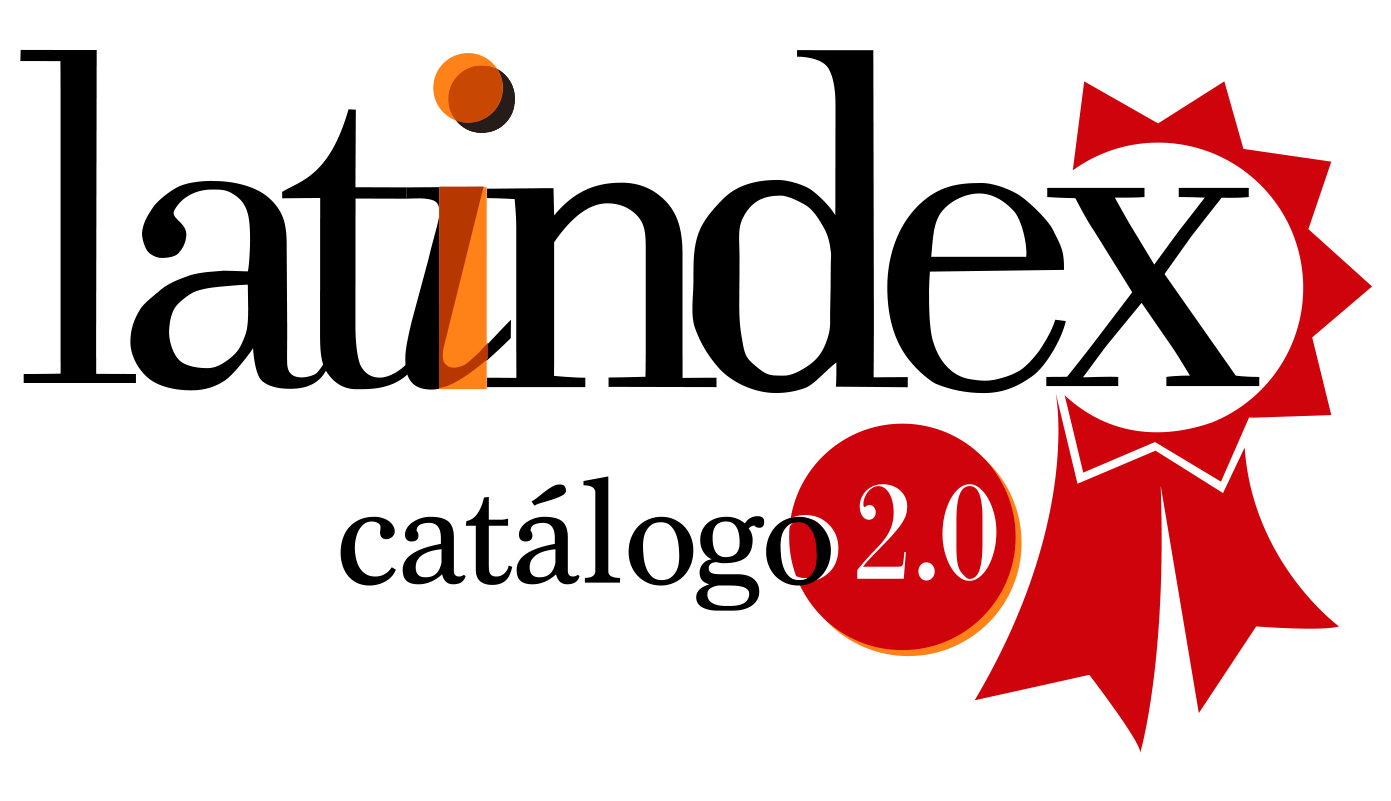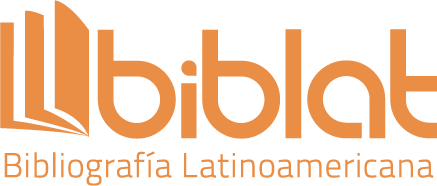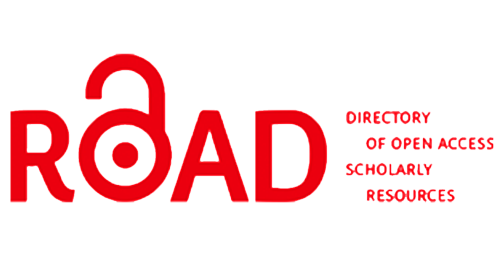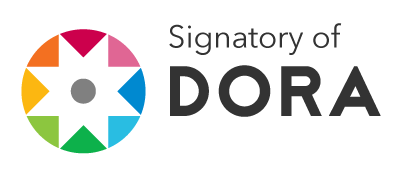Framework for educational reflection: a methodological proposal
DOI:
https://doi.org/10.38123/rre.v1i1.87Keywords:
reflective strategies, reflective practice, methodological proposal, public policyAbstract
The article aims to understand how different reflective strategies influenced a process of change of beliefs and teaching practices of four English teachers in Chile. This, to establish a methodological proposal of six reflective strategies to contribute to public policy since indications that allow to guide and accompany teacher reflection are not yet contemplated. The methodology uses a qualitative analysis based on what is proposed by the content analysis. The results show that the strategies worked differently in each of the participants, establishing four different change processes. In this way, it can be concluded that it is necessary to design an intervention that questions teachers through the use of different questions and reflective strategies, depending on the type of reflection that you want to promote.
Downloads
References
Agencia de Calidad de la Educación. (26 de octubre de 2017). Nueva ley de carrera docente. https://web.archive.org/web/20201111165705/https://www.agenciaeducacion.cl/noticias/nueva-ley-carrera-docente/
Al-Ahdal, A. A. M. H y Al-Awaid, S. A. A. (2014). Reflective Teaching and Language Teacher Education Programmes: A Milestone in Yemen and Saudi Arabia. Journal of Language Teaching and Research, 5(4), 759-768. https://doi.org/10.4304/jltr.5.4.759-768
Alvarado, L. y García, M. (2008). Características más relevantes del paradigma sociocrítico: su aplicación en investigaciones de educación ambiental y de enseñanza de las ciencias realizadas en el Doctorado de Educación del Instituto Pedagógico de Caracas. Sapiens, 9(2), 187-202. https://www.redalyc.org/articulo.oa?id=41011837011
Borg, S. (2011). The impact of in-service teacher education on language teachers’ beliefs. System, 39(3), 370-380. https://doi.org/10.1016/j.system.2011.07.009
Burns, A. (1999). Collaborative Action Research for English Language Teachers. Cambridge University Press.
Centro de Perfeccionamiento, Experimentación e Investigaciones Pedagógicas. (2020). Manual de la Autoevaluación. Gobierno de Chile. https://www.docentemas.cl/descargas/documentos_descargables/2020/Manual_AE_2020.pdf
Cobb, P., Confrey, J., diSessa, A., Lehrer, R.y Schauble, L. (2003). Design Experiments in Educational Research. Educational Researcher, 32(1), 9-13. https://www.jstor.org/stable/3699928
Cohen, L., Manion, L.y Morrison, K. (2011). Research Methods in Education (6a. ed.). Routldege.
Conway, C. y Denny, H. (2013). Reflection and dialogue in postgraduate professional development for experienced language teachers. New Zealand Studies in Applied Linguistics, 19(1), 5-20. http://hdl.handle.net/10292/5713
Farrell, T. S. C. (2007). Reflective Language Teaching: from Research to Practice. Continuum.
Farrell, T. S. C, (2008). Reflective practice in the professional development of teachers of adult English language learners. Center for Applied Linguistics.
Farrell, T. S. C. (2011). Keeping SCORE: Reflective Practice through Classroom. Observations. RELC Journal, 42(3), 265-272. https://doi.org/10.1177/0033688211419396
Farrell, T. S. C. (2013). Critical incident analysis through narrative reflective practice: a case study. Iranian Journal of Language Teaching Research, 1(1), 79-89. https://eric.ed.gov/?id=EJ1127432
Farrell, T.S.C (2018). Reflective Practice for Language Teachers. En John I. Liontas (ed.) The TESOL Encyclopedia of English Language Teaching. John Wiley & Sons, Inc.
Farrell, T. S. C. y Bennis, K. (2013). Reflecting on ESL Teacher Beliefs and Classroom Practices: A Case Study. RELC Journal, 44(2), 163-176. https://doi.org/10.1177/0033688213488463
Farrell, T. S. C. y Ives, J. (2014). Exploring teacher beliefs and classroom practices through reflective practice: A case study. Language Teaching Research, 19(5), 1-17. https://doi.org/10.1177/1362168814541722
Fatemipour, H. (2013). The efficiency of the tools used for reflective teaching in ESL context. Procedia-Social and Behavioral Sciences, 93, 1398-1403. https://doi.org/10.1016/j.sbspro.2013.10.051
Hoadley, C. M. (2004). Methodological Alignment in Design-Based Research. Educational Psychologist, 39(4), 203-212. https://doi.org/10.1207/s15326985ep3904_2
Jaeger, E. (2013). Teacher Reflection: Supports, Barriers, and Results. Issues in Teacher Education, 22(1), 89-104. https://eric.ed.gov/?id=EJ1014037
Korthagen, F.A. (2010). La práctica, la teoría y la persona en la formación del profesorado. Revista Interuniversitaria de Formación del Profesorado, 68, 83-102. https://dialnet.unirioja.es/servlet/articulo?codigo=3276048
Liu, L. y Zhang, Y. (2014). Enhancing Teachers’ Professional Development through Reflective Teaching. Theory and Practice in Language Studies, 4(11), 2396-2401. https://doi.org/10.4304/tpls.4.11.2396-2401
Ma, J. y Ren, S. (2011). Reflective Teaching and Professional Development of Young College English Teachers-From the Perspective of Constructivism. Theory and Practice in Language Studies, 1(2), 153-156. https://doi.org/10.4304/tpls.1.2.153-156
Mann, S. y Walsh, S. (2017). Reflective Practice in English Language Teaching: Research-Based Principles and Practices. Routledge.
Mitchell, I. (08 de enero de 2019). Features of the trajectory of professional development of PEEL teachers. Seminario Comunidades de Aprendizaje: resignificando el trabajo colaborativo entre docentes. Pontificia Universidad Católica de Valparaíso, Valparaíso, Chile.
Nocetti, A.; Sáez, F.; Contreras, G.; Soto, C. y Espinoza, C. (2020). Práctica reflexiva en docentes: Una revisión sistemática de aspectos teórico-metodológicos. Revista Espacios, 41(26), 118-131. http://www.revistaespacios.com/a20v41n26/20412611.html
Orden, A. de la y Mafokozi, J. (1999). La investigación educativa: naturaleza, funciones y ambigüedad de sus relaciones con la práctica y la política educativas. Revista de Investigación Educativa, 17(1), 7-29. https://revistas.um.es/rie/article/view/122251
Perines, H. (2018). ¿Por qué la investigación educativa no impacta en la práctica docente? Estudios sobre Educación, 34, 9-27. https://doi.org/https://doi.org/10.15581/004.34.9-27
Pulido, M. (2017). Los dilemas propios de una investigación cualitativa en el ámbito de la cooperación al desarrollo: una cuestión delicada. (1), Acta Bioethica, 23, 109-117. http://dx.doi.org/10.4067/S1726-569X2017000100109
Richards, J. C. y Farrell, T. S. C. (2011). Practice Teaching: A Reflective Approach. Cambridge University Press.
Russell, T. (2012). Cambios paradigmáticos en la formación de profesores: peligros, trampas y la promesa no cumplida del profesional reflexivo. Encuentros sobre Educación, 13, 71-91. https://dialnet.unirioja.es/servlet/articulo?codigo=4110032
Wallace, M. J. (1998). Action Research for Language Teachers. Cambridge University Press.
Walsh, S. y Mann, S. (2015). Doing reflective practice: a data-led way forward. ELT Journal, 69(4), 3-10. http://dx.doi.org/10.1093/elt/ccv018
Zambrano Martínez, N. R. (2020). Práctica reflexiva en la formación de maestros: el caso de la Escuela Normal Superior de Pasto. Revista Universidad y Sociedad, 12(1), 40-52. http://scielo.sld.cu/scielo.php?script=sci_arttext &pid=S2218-36202020000100040 &lng=es &tlng=es
Zeichner, K. (1993). El maestro como profesional reflexivo. Cuadernos de Pedagogía, 220, 44-49. https://www.practicareflexiva.pro/wp-content/uploads/2012/04/Org-El-maestro-como-profesional-reflexivo-de-Kenneth-M.-Zeichner.pdf
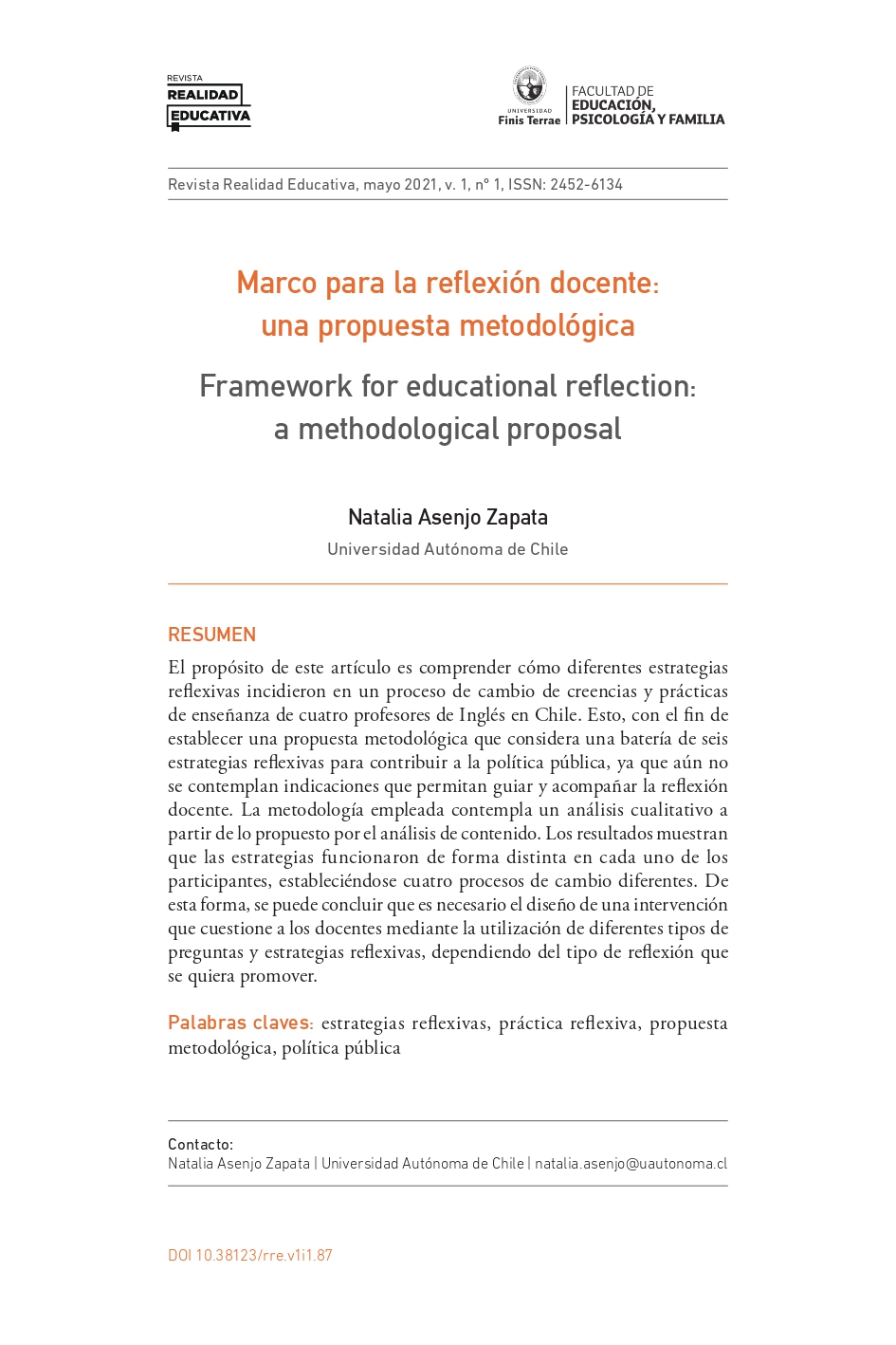
Published
How to Cite
Issue
Section
License
Copyright (c) 2021 Natalia Asenjo Z.

This work is licensed under a Creative Commons Attribution-NonCommercial-NoDerivatives 4.0 International License.
Los contenidos de esta revista se distribuyen bajo una licencia Atribución/Reconocimiento-NoComercial-SinDerivados 4.0 Internacional.


